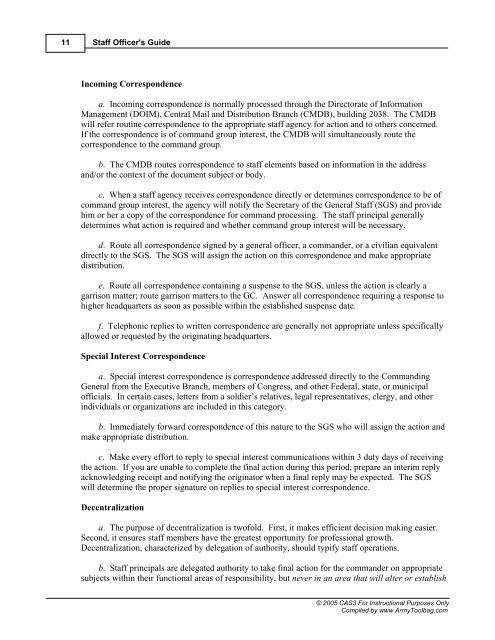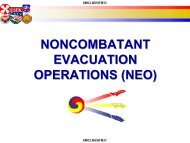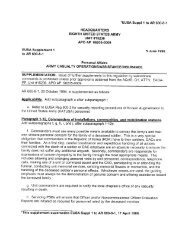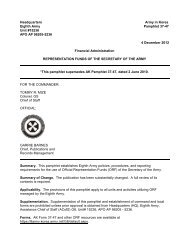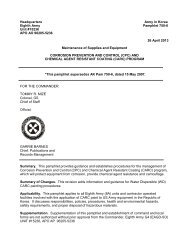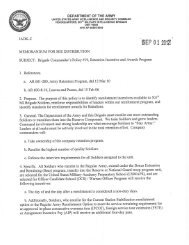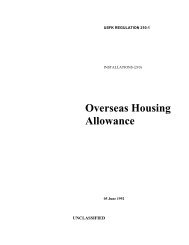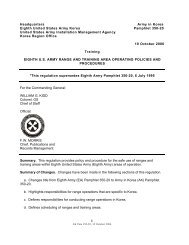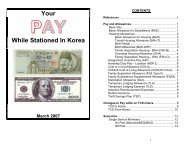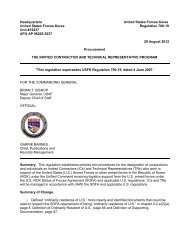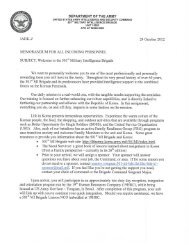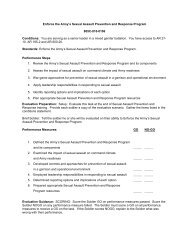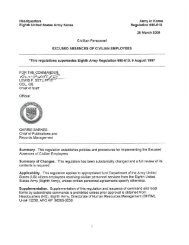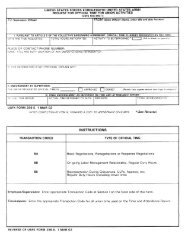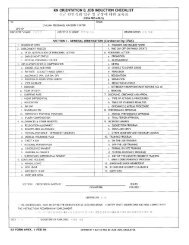CAS3 Staff Officer Guide - U.S. Army
CAS3 Staff Officer Guide - U.S. Army
CAS3 Staff Officer Guide - U.S. Army
Create successful ePaper yourself
Turn your PDF publications into a flip-book with our unique Google optimized e-Paper software.
11<br />
<strong>Staff</strong> <strong>Officer</strong>'s <strong>Guide</strong><br />
Incoming Correspondence<br />
a. Incoming correspondence is normally processed through the Directorate of Information<br />
Management (DOIM), Central Mail and Distribution Branch (CMDB), building 2038. The CMDB<br />
will refer routine correspondence to the appropriate staff agency for action and to others concerned.<br />
If the correspondence is of command group interest, the CMDB will simultaneously route the<br />
correspondence to the command group.<br />
b. The CMDB routes correspondence to staff elements based on information in the address<br />
and/or the context of the document subject or body.<br />
c. When a staff agency receives correspondence directly or determines correspondence to be of<br />
command group interest, the agency will notify the Secretary of the General <strong>Staff</strong> (SGS) and provide<br />
him or her a copy of the correspondence for command processing. The staff principal generally<br />
determines what action is required and whether command group interest will be necessary.<br />
d. Route all correspondence signed by a general officer, a commander, or a civilian equivalent<br />
directly to the SGS. The SGS will assign the action on this correspondence and make appropriate<br />
distribution.<br />
e. Route all correspondence containing a suspense to the SGS, unless the action is clearly a<br />
garrison matter; route garrison matters to the GC. Answer all correspondence requiring a response to<br />
higher headquarters as soon as possible within the established suspense date.<br />
f. Telephonic replies to written correspondence are generally not appropriate unless specifically<br />
allowed or requested by the originating headquarters.<br />
Special Interest Correspondence<br />
a. Special interest correspondence is correspondence addressed directly to the Commanding<br />
General from the Executive Branch, members of Congress, and other Federal, state, or municipal<br />
officials. In certain cases, letters from a soldier’s relatives, legal representatives, clergy, and other<br />
individuals or organizations are included in this category.<br />
b. Immediately forward correspondence of this nature to the SGS who will assign the action and<br />
make appropriate distribution.<br />
c. Make every effort to reply to special interest communications within 3 duty days of receiving<br />
the action. If you are unable to complete the final action during this period, prepare an interim reply<br />
acknowledging receipt and notifying the originator when a final reply may be expected. The SGS<br />
will determine the proper signature on replies to special interest correspondence.<br />
Decentralization<br />
a. The purpose of decentralization is twofold. First, it makes efficient decision making easier.<br />
Second, it ensures staff members have the greatest opportunity for professional growth.<br />
Decentralization, characterized by delegation of authority, should typify staff operations.<br />
b. <strong>Staff</strong> principals are delegated authority to take final action for the commander on appropriate<br />
subjects within their functional areas of responsibility, but never in an area that will alter or establish<br />
© 2005 <strong>CAS3</strong> For Instructional Purposes Only<br />
Compiled by www.<strong>Army</strong>Toolbag.com


